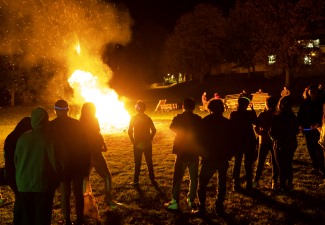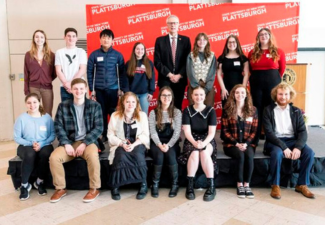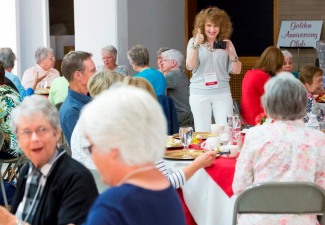Journalism Alumna Named Among Most Powerful Arab Women
A SUNY Plattsburgh alumna has just been named one of the 100 most powerful Arab women.
Arabian Business ranked journalist Raghida Dergham No. 42 on its list, calling the 1973 graduate “one of the Arab world’s most well-known female journalists.”
A columnist and senior diplomatic correspondent for Al Hayat, a London-based newspaper, Dergham has interviewed many of the world’s top newsmakers, including Gen. David Petraeous, U.N. Secretary General Ban Ki-moon, Jordanian King Abdullah, Iraqi Prime Minister Nouri al-Maliki, Sudanese President Omar al-Bashir and World Trade Center-attack mastermind Ramzi Yousef.
.jpg) Dergham, who had had her work published in a women’s magazine as early as age 15,
always knew she wanted to be a journalist. As a result, when she moved from Lebanon
to join her uncle in the North Country at 17, she applied to SUNY Plattsburgh and
immediately looked into getting a journalism degree.
Dergham, who had had her work published in a women’s magazine as early as age 15,
always knew she wanted to be a journalist. As a result, when she moved from Lebanon
to join her uncle in the North Country at 17, she applied to SUNY Plattsburgh and
immediately looked into getting a journalism degree.
At the time, there was no such program on campus, but Elliot Allen, then the dean of arts and humanities, pulled together Al Montanaro and other members of the English and speech departments and set them into motion, helping Dergham create her own major in creative writing and journalism.
“They went out of the way to accommodate me,” Dergham said. “Al Montanaro was sort of spearheading the effort, and it was a completely different experience because there was an open office policy. Everybody would just go to Al’s office, and we all worked together.”
This effort helped lay the groundwork for the college’s current journalism department with its award-winning Cardinal Points newspaper, and that makes Dergham very proud.
Dergham’s beat is the United Nations, but she also reports from locations around the world four or five months out of the year, covering international politics and writing a column.
“In my culture, for a woman to enter the field of politics, in terms of journalism, this is not the norm,” Dergham told Arabian Business. “A woman cannot think this way. A woman cannot do this.”
Yet, Dergham has.
In 1979, at the age of 26, Dergham was already interviewing high-level officials, like Ferdinand Marcos, then-president of the Philippians. Ten minutes into the interview, he told her that her time was up, but she told him, no, she wasn’t finished and surprised him into completing the interview.
“Especially if you are young and a woman, they somehow presuppose that you are not going to be that smart or knowledgeable,” Dergham said. “So when you are prepared with enough knowledge and courage, they are taken aback. They are very surprised, and sometimes you get away with more, because I would ask the most aggressive questions but with the least aggressive tone.”
Her line of work has sometimes put her in dangerous positions, interviewing heads of state from countries where women have few rights and where the media is censored. Dergham admits that she would never have been able to ask some of the questions she has if the interviews had taken place in the officials’ home countries.
Lebanese officials once banned Dergham and canceled her passport, accusing her of treason because she participated in a public debate with an Israeli official.
“In Lebanon, they were killing colleagues for what they had said, and they threatened that if I didn’t back down, I would be next,” she said. “My mother would tell me to ease up. My father would tell her, ‘It’s too late. She went too far.’
“There were many moments of great fear,” she said. “Anyone with courage will understand the meaning of fear.”
But Dergham continued to do what she was doing, asking the hard questions and reporting on the truth as she saw it.
“It was worth it,” she said.
After the ban was lifted and she went back to Lebanon, she found herself greeted by mothers and daughters, telling her “We await you. We love you. We respect you.”
“A mother and daughter would come up, and the mother would say, ‘I want my daughter to be like you.’ And the daughter would say, ‘You are an inspiration.’ I’d earned their credibility,” Dergham said.
Now, as change is happening in the Middle East, Dergham is hopeful.
“I think these are different, very interesting times, and we will be seeing more of women taking their rightful place and making history because in the past they hadn’t participated in history making,” she said. “They were pushed aside; that has happened over and over again, even recently, as was the case in Iraq.
“I am hoping that this time, it’s going to be different. I’m hoping that the young people are going to understand the value of putting to work half the population. Change is not going to happen by men alone. They are going to need women on their side more than ever.”
A member of the 1996 SUNY Honor Roll of Alumni and the 1991 recipient of the college’s Distinguished Alumna Award, Dergham remains connected to the college and has even founded an endowment in support of journalism students.
She also still has family in the Plattsburgh area.
News
Knelly Named Special Adviser to SUNY for Clinton Transition

Sports Hall of Fame, Unity Day at the Pond Among Homecoming 2023 Highlights
SUNY Plattsburgh Grad Finalist at National Entrepreneurship Competition

North Country Scholarship Program marks 15 years of investing in region’s top students
Alumni Laud Faculty Connections, Experiences for Successful Career Paths
